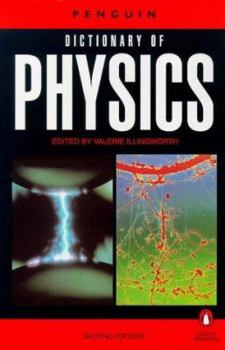Dictionary of Physics, the Penguin: Second Edition
Select Format
Select Condition 
Book Overview
In the PENGUIN REFERENCE series, the third revised edition of an illustrated dictionary containing definitions of words and terminology used in the field of physics. It includes articles on related... This description may be from another edition of this product.
Format:Mass Market Paperback
Language:English
ISBN:0140512365
ISBN13:9780140512366
Release Date:February 2001
Publisher:Puffin Books
Length:544 Pages
Weight:0.75 lbs.
Dimensions:0.9" x 5.1" x 7.8"
Customer Reviews
1 rating
Useful reference
Published by Thriftbooks.com User , 23 years ago
It is tempting to compare this dictionary with the Dictionary of Physics (Oxford Paperback Reference, ISBN 0-19-280013-1). They are both coming from an established British publishing house, both are paperbacks, both the same size, both updated in the same year (2000), and, curiously, they have both been prepared by Market House Books, Ltd.Jumping to the conclusion that we are talking about variations of the same book would have been erroneous, though. A quick glance at the inside reveals the differences. Although the difference in the nominal number of terms defined is not that great (4500 for Penguin vs. 3500 - sometimes claimed even 4000 - for Oxford), the subjective feeling is that Penguin knows a lot more terms. Oxford, on the other hand, also contains short biographies of selected scientists, articles on each of the 109 chemical elements, some dozen two-page feature articles on selected topics like Big Bang, Free Electron Theory etc, and about just as many chronologies of selected areas of physics. Also, the definition of terms are on average longer in the Oxford dictionary - the definition of "orbital" is, for instance, two whole pages long, "death of a star" takes up one and a half page, etc. The illustrations in Penguin vastly outnumber those in Oxford, but I found those latter more informative. Both delve into technology as well, especially semiconductor technology, and, for my opinion, spend (or waste) too much space on computer science technology. Do we really need CPU, RAM, CD-ROM, DAT etc. defined in a Physics dictionary?Which one is more useful? As a non-native speaker, it is likely that I use it differently than a native speaker would, so your mileage may vary. I've been educated in physics in my native language, and I think in it when I think physics. When I have to write in English, I occasionally encounter a term which I am not quite sure whether I know the correct English expression, although it is lurking somewhere in the back of my head. So it's a time to check it in the dictionary. It is likely that I will already find it in Penguin, and not find it in Oxford. In the latter case, I have to look for a broader term to find it. Searching through Oxford is therefore somewhat more time-consuming. However, the process is reversed when I don't already know in advance the term I want to check, but I do know the broader term, then Oxford comes in more handy. So, in a way, I find the two dictionaries complementary.






